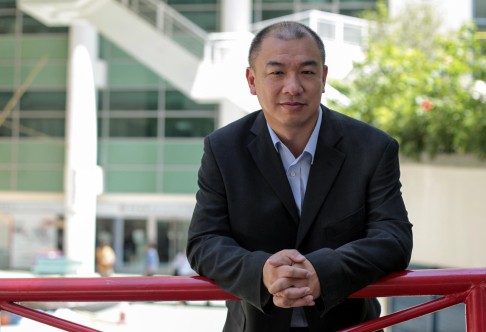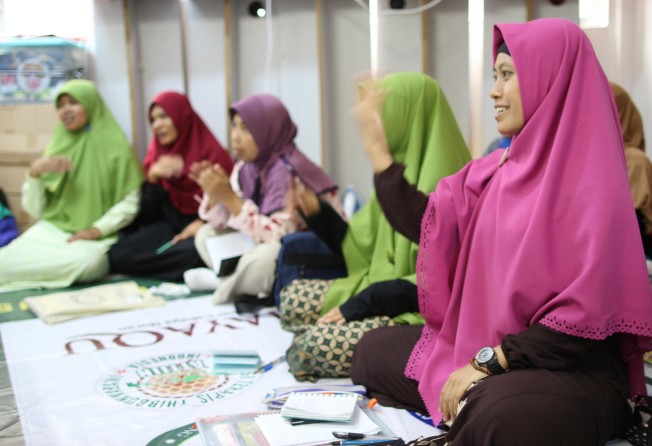
Learning from 18 to 80: Hong Kong's adult education boom
From professionals upgrading their skills, to working adults seeking intellectual fulfilment, retirees attending tertiary classes, and home learners studying online and via MOOCs, there's been an explosion in lifelong learning. Policymakers need to take note

When Chow Yat-fat started his first distance learning diploma in computer programming at the Open University of Hong Kong in 1995, he was three years into his career as a Chinese typist in a media company. In 2014 - 19 years later - he graduated with a bachelor's degree and received the institution's prestigious HK$10,000 Alumni Scholarship for his academic achievements.
Throughout his years of part-time study, Chow rose up the ranks in his company, eventually becoming a director in its digital department. Now, he holds a managerial position in an education publishing house founded by his company in 2010.
After dedicating almost two decades of his working life to distance learning - a blended mode of education that Open University provides through online coursework, in-class tutorials and school-based exams for working adults - Chow says he has achieved more than he set out to.
"My reasons were practical when I decided to study while working. I wanted to get the tertiary education I didn't have - and my job demanded it," says Chow. "I think my biggest gains were the recognition and opportunities I was given at work for showing commitment through my studies."

As an employer now, Chow values similar qualities of commitment and goal orientation in others pursuing a similar path. "If someone is willing to go back to school, their positive attitude makes them extra valuable in the workplace - perhaps even more so than people who come with impressive educational backgrounds," says Chow.
While similar success stories abound, adult education in Hong Kong today encompasses much more than working adults thriving professionally through award-bearing continuing education. The sector has become increasingly diverse, having grown in response to steadily broadening demand brought about by education reforms from the late 1990s that made lifelong learning a priority.
Statistics from the most recent Survey on the Demand for Continuing Education in Hong Kong, conducted by HKU Space in 2011/2012, show that 1.46 million adults participated in continuing education that year. Among the programmes in which they took part, 65.5 per cent did not lead to a qualification, 23.5 per cent led to a non-degree qualification and a small proportion led to degrees upon completion. In other words, many members of Hong Kong's working population are seeking a diverse range of opportunities not directly related to their careers.
Chow's colleague Iris Chan, who heads their company's marketing department, is also an Open University alumnus, but has chosen a different course of study, opting to explore the humanities for intellectual fulfilment rather than strictly professional purposes.

"Learning should not always be about a specific work goal because that makes your focus narrow," she says. "I finished courses in Chinese literature and cultural history out of interest, but I found my new knowledge also helps me with my work, as marketing involves communicating effectively with different people."
It's not only working adults participating in lifelong learning. Maureen Tam Siu-ling, associate professor of the department of international education and lifelong learning at the Hong Kong Institute of Education (HKIEd), says demand for continuing education in Hong Kong reaches far beyond what the term is usually equated with.
"Continuing education can take place between the ages of 18 and 80 and beyond," she says. "And it could take place in all sorts of formal and informal settings. The demand is indeed high, but it is also broad and hard to define."
As Hong Kong's population continues to age, it becomes ever more important to foster a more inclusive understanding of what continuing education entails, so that policy support can be channelled to benefit adults seeking a range of different learning opportunities.
Continuing education can take place between the ages of 18 and 80 and beyond
"Our ageing population structure means that continuing education should shift in focus from working adults to older adults," says Tam. "There is a huge demand for policy support for lifelong learning among people who are aged 50 and up because of demographic changes."
At HKIEd, Tam heads the Elder Academy, through which retired adults can enrol in a range of general education courses along with the institute's undergraduate students. This semester, courses on offer range from Buddhist ethics to soccer politics. The extremely positive response shows the high demand for lifelong learning among the elderly, even though they are often neglected in policy considerations that focus on reaping direct economic benefits from continuing education.
As well as catering to various age groups, adult education in Hong Kong encompasses overlooked population sectors, including minority groups such as domestic helpers. Although this type of education is not formalised in Hong Kong's official accreditation framework, it is a vibrant sector providing many adults working in Hong Kong with opportunities for personal and professional advancement.
Cahayaqu - which means "receiving light" in Bahasa Indonesian - is a school that offers Indonesian helpers free courses in a variety of subjects every weekend. In a two-hour Sunday morning session, students sit around in the school's only classroom and learn how to teach children English, singing nursery rhymes along with the teacher Mubarak, a Malaysian who has a teacher training school in Jakarta.
Students who complete the course receive a certificate that is recognised widely in Indonesia and furthers employment prospects in the field of childhood English education. As Sutin, a respected volunteer at Cahayaqu, puts it, "the aim of our programmes is to teach domestic helpers in Hong Kong something useful, so that they can be self-sufficient and find employment back in Indonesia."
I take care of a three-year-old boy here, and his parents speak to him in a mixture of English and Chinese. I want to fit into that bilingual home environment
Wongso, an eager student in the course, says her reasons for taking on extra studies on her one day off each week are related to both her domestic duties in Hong Kong and her prospects back in Indonesia. "I take care of a three-year-old boy here, and his parents speak to him in a mixture of English and Chinese. I want to fit into that bilingual home environment," she says. "I also have a small boy of my own. I want to use what I learned to teach him, and perhaps find a job as a teacher back home."
As the expanding demand for adult education becomes increasingly broad-based - involving the participation of not just working adults but virtually every other sector of the adult population - new modes of learning have emerged to fill gaps in provision.
In particular, online learning and massive open online courses (MOOCs) remove age limits and other learning prerequisites, making continuing education more accessible than ever before to everyone. These developments have generated a great deal of demand of their own among adults who never otherwise thought of going back to study.
"Many adults didn't participate in continuing education before because they found it inconvenient, or didn't have money, or didn't think they had the requisite background," says Tam. "But MOOCs and online learning extend learning beyond barriers, catering to different needs to fulfil increasingly diverse demands."